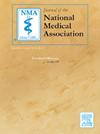Improving Colon Cancer Screening by Incorporating a Diversity Equity and Inclusion Curriculum in an Internal Medicine Residency
IF 2.3
4区 医学
Q1 MEDICINE, GENERAL & INTERNAL
引用次数: 0
Abstract
Introduction
Colon cancer causes significant morbidity and mortality in marginalized communities in the United States. Screening can improve outcomes by identifying pre-cancerous and early stage colon cancers allowing for timely intervention. Diversity Equity and Inclusion (DEI) curriculum can increase awareness of health disparities and be a component of a multifaceted strategy to improve health outcomes. We evaluated the impact of a DEI educational intervention upon colon cancer screening rates in an internal medicine residency at an urban university medical center that serves a majority (64%) African-American population.
Methods
Community-based focus groups that included healthcare learners and African-American community members were conducted. Discussions were transcribed and thematic analysis was performed. An internal medicine residency DEI curriculum was developed based upon focus group learnings. Curriculum included education about colon cancer disparities, bias mitigation, social determinants of health, culturally responsive care along with experiential learning through a visit to an African American history museum and community exploration workshop. Colon cancer screening rates during a 2 year period were assessed prior to and following the educational intervention.
Results
Focus groups discussion, involving African-American community members and internal medicine residents, provided the foundation for curriculum development. Barriers impacting colon cancer screening included awareness, insurance status, colonoscopy logistics, fear of cancer or procedures, physician trust and communication. In addition, African Americans, compared to health care learners, more frequently identified racial disparity in health care (p=0.0278), physician respect toward patients (p=0.0278) and inadequate physician communication (p=0.0013). All internal medicine residents during a 1 year period participated in the DEI curriculum. Patient navigation, an identified community need, was incorporated into the colon cancer screening recommendations offered by resident physicians. Colon cancer rates were among 2426 patients seen by physicians increased from 57.8% to 72.3% following the educational intervention.
Discussion
There are a variety of DEI educational strategies that have been designed for resident physicians. However, most of the programs are one-time sessions, although some have spanned over 3 years. The most common assessment of DEI educational strategies has been pre- and post-intervention knowledge testing. There has been limited information about the impact of resident physicians’ patient care. This study was unique because it developed a multifaceted DEI curriculum which resulted in an improvement in colon cancer screening at an urban university medical center. While it can be difficult to directly measure the impact of DEI educational programs on health care delivery, this program highlights the importance of continued efforts to establish interventions that are focused on decreasing disparities in health care and improving clinical outcomes.
通过在内科住院医师中纳入多元化、公平和包容课程来改善结肠癌筛查
在美国的边缘社区,结肠癌的发病率和死亡率都很高。筛查可以通过识别癌前和早期结肠癌来改善结果,从而允许及时干预。多样性、公平和包容(DEI)课程可以提高对健康差异的认识,并成为改善健康成果的多方面战略的一个组成部分。我们评估了DEI教育干预对城市大学医疗中心内科住院医师结肠癌筛查率的影响,该中心为大多数(64%)非裔美国人提供服务。方法采用以社区为基础的焦点小组,包括医疗保健学习者和非洲裔美国人社区成员。会议记录了讨论内容,并进行了专题分析。在焦点小组学习的基础上,制定了内科住院医师DEI课程。课程包括有关结肠癌差异、减轻偏见、健康的社会决定因素、符合文化的护理的教育,以及通过参观非裔美国人历史博物馆和社区探索讲习班进行的体验式学习。在教育干预之前和之后的2年期间评估结肠癌筛查率。结果是非裔美国人社区成员和内科住院医生参与的焦点小组讨论为课程开发提供了基础。影响结肠癌筛查的障碍包括意识、保险状况、结肠镜检查后勤、对癌症或手术的恐惧、医生的信任和沟通。此外,与医疗保健学习者相比,非洲裔美国人更频繁地发现医疗保健方面的种族差异(p=0.0278)、医生对患者的尊重(p=0.0278)和医生沟通不足(p=0.0013)。所有内科住院医师在1年内都参加了DEI课程。病人导航,一个确定的社区需求,被纳入住院医师提供的结肠癌筛查建议。在教育干预后,2426名患者的结肠癌发病率从57.8%上升到72.3%。讨论针对住院医师设计了多种DEI教育策略。然而,大多数课程都是一次性的,尽管有些课程长达3年以上。对DEI教育策略最常见的评估是干预前和干预后的知识测试。关于住院医师对病人护理的影响的信息有限。这项研究是独一无二的,因为它开发了一个多方面的DEI课程,从而改善了城市大学医学中心的结肠癌筛查。虽然很难直接衡量DEI教育计划对医疗保健服务的影响,但该计划强调了继续努力建立干预措施的重要性,这些干预措施的重点是减少医疗保健方面的差距和改善临床结果。
本文章由计算机程序翻译,如有差异,请以英文原文为准。
求助全文
约1分钟内获得全文
求助全文
来源期刊
CiteScore
4.80
自引率
3.00%
发文量
139
审稿时长
98 days
期刊介绍:
Journal of the National Medical Association, the official journal of the National Medical Association, is a peer-reviewed publication whose purpose is to address medical care disparities of persons of African descent.
The Journal of the National Medical Association is focused on specialized clinical research activities related to the health problems of African Americans and other minority groups. Special emphasis is placed on the application of medical science to improve the healthcare of underserved populations both in the United States and abroad. The Journal has the following objectives: (1) to expand the base of original peer-reviewed literature and the quality of that research on the topic of minority health; (2) to provide greater dissemination of this research; (3) to offer appropriate and timely recognition of the significant contributions of physicians who serve these populations; and (4) to promote engagement by member and non-member physicians in the overall goals and objectives of the National Medical Association.

 求助内容:
求助内容: 应助结果提醒方式:
应助结果提醒方式:


